
The Family Computer Disk System, commonly shortened to the Famicom Disk System or just Disk System, is a peripheral for Nintendo's Family Computer home video game console, released only in Japan on February 21, 1986. It uses proprietary floppy disks called "Disk Cards" for cheaper data storage and it adds a new high-fidelity sound channel for supporting Disk System games.
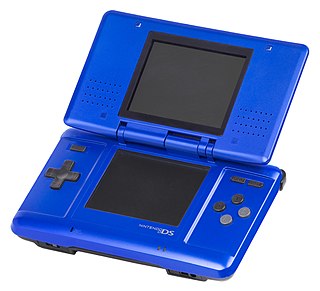
The Nintendo DS is a handheld game console produced by Nintendo, released globally across 2004 and 2005. The DS, an initialism for "Developers' System" or "Dual Screen", introduced distinctive new features to handheld games: two LCD screens working in tandem, a built-in microphone and support for wireless connectivity. Both screens are encompassed within a clamshell design similar to the Game Boy Advance SP. The Nintendo DS also features the ability for multiple DS consoles to directly interact with each other over Wi-Fi within a short range without the need to connect to an existing wireless network. Alternatively, they could interact online using the now-defunct Nintendo Wi-Fi Connection service. Its main competitor was Sony's PlayStation Portable during the seventh generation of video game consoles.
In the history of video games, the sixth-generation era is the era of computer and video games, video game consoles, and handheld gaming devices available at the turn of the 21st century, starting on November 27, 1998. Platforms in the sixth generation include consoles from four companies: the Sega Dreamcast (DC), Sony PlayStation 2 (PS2), Nintendo GameCube (GC), and Microsoft Xbox. This era began on November 27, 1998, with the Japanese release of the Dreamcast, which was joined by the PlayStation 2 on March 4, 2000, and the Xbox and Gamecube on November 15 and 18, 2001, respectively. In April 2001, the Dreamcast was the first to be discontinued. Xbox was next in 2006, GameCube in 2007 and PlayStation 2 was the last, in January 2013. Meanwhile, the seventh generation of consoles started on November 22, 2005 with the launch of the Xbox 360.

EA Sports FC is a series of association football video games developed and released annually by Electronic Arts under the EA Sports label. As of 2011, the FIFA franchise has been localised into 18 languages and available in 51 countries. Listed in Guinness World Records as the best-selling sports video game franchise in the world, the FIFA series has sold over 325 million copies as of 2021. On 10 May 2022, it was announced that EA and FIFA's partnership is set to come to an end after 30 years from July 2023 onwards; the series will be retitled EA Sports FC. FIFA intends to enter a partnership with a new developer to produce "the real game that has the FIFA name".

GameSpy was an American provider of online multiplayer and matchmaking middleware for video games founded in 1996 by Mark Surfas. After the release of a multiplayer server browser for the game, QSpy, Surfas licensed the software under the GameSpy brand to other video game publishers through a newly established company, GameSpy Industries, which also incorporated his Planet Network of video game news and information websites, and GameSpy.com.

Mr. Driller is a puzzle video game franchise created by Yasuhito Nagaoka and Hideo Yoshizawa for Namco. The eponymous first game was released in 1999 for arcades and several home consoles, such as the PlayStation. Gameplay in the series consists of controlling Susumu Hori, the titular Mr. Driller, or one of his friends and destroying colorful formations of blocks to make it to the bottom of a well. In order to survive, players need to collect air capsules to replenish their depleting oxygen and avoid being crushed by falling blocks.

Chessmaster is a chess-playing computer game series, which is owned and developed by Ubisoft. It is the best-selling chess franchise in history, with more than five million units sold as of 2002.
The James Bond video game franchise is a series centering on Ian Fleming's fictional British MI6 agent, James Bond. Games of the series have been predominantly shooter games, with some games of other genres including role-playing and adventure games. Several games are based upon the James Bond films and developed and published by a variety of companies, The intellectual property is owned by Danjaq.

Over one hundred video games based on the Star Wars franchise have been released, dating back to some of the earliest home consoles. Some are based directly on films while others rely heavily on the Star Wars Expanded Universe.
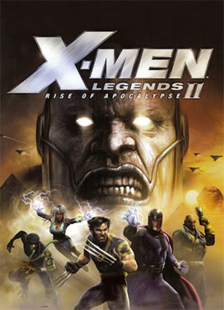
X-Men Legends II: Rise of Apocalypse is an action role-playing game developed primarily by Raven Software and published by Activision. It is the follow up to 2004's X-Men Legends. It was released in September 2005 for the GameCube, Microsoft Windows, N-Gage, PlayStation 2, PlayStation Portable and Xbox. It is set after the events of X-Men Legends and features the mutant supervillain Apocalypse as the primary antagonist.
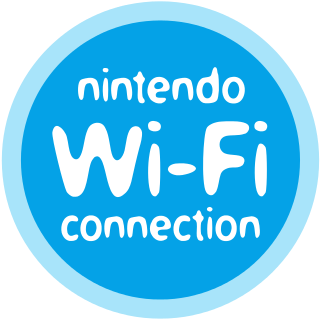
Nintendo Wi-Fi Connection was an online multiplayer gaming service run by Nintendo to provide free online play in compatible Nintendo DS and Wii games. The service included the company's Wii Shop Channel and DSi Shop game download services. It also ran features for the Wii and Nintendo DS systems.

Glu Mobile LLC is an American developer and publisher of video games for mobile phones and tablet computers. Founded in San Francisco, California, in 2004, Glu offers products to multiple platforms including Java ME-based devices, Android, Windows Phone, Google Chrome, and Amazon. It was previously listed on Nasdaq before it was acquired by Electronic Arts in April 2021.

There have been several video game adaptations of Parker Brothers and Hasbro's board game Monopoly.
Barking Lizards Technologies was an American video game developer that develops for mobile phones, PlayStation 2, Game Boy Advance, Nintendo DS, PlayStation Portable, Wii and personal computer. Founded in 2001, Barking Lizards Technologies is based in Richardson, Texas. Their titles were published through several major video game publishers, namely THQ, and Activision, and have recently published a title of their own, Osiris Legends for iOS.
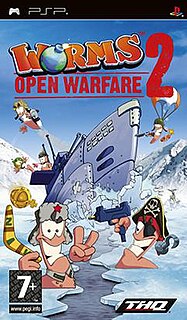
Worms: Open Warfare 2 is a 2007 2D tactical artillery and strategy video game developed by Team17 and Two Tribes, and published by THQ. The game is a direct sequel to Worms: Open Warfare and was released for the PlayStation Portable and Nintendo DS in 2007.

N+ is the console and handheld version of the game originally made for systems powering Adobe Flash, N, which was developed by Metanet Software. N+ for Xbox Live Arcade was developed by Slick Entertainment and published by Metanet Software. Unique versions of the game were also ported separately to the PlayStation Portable and Nintendo DS by developers SilverBirch Studios and Atari. Metanet Software licensed their N IP for this deal, provided single player level design for both versions, and consulted on the project.

Battle.net is an Internet-based online game, social networking service, digital distribution, and digital rights management platform developed by Blizzard Entertainment. The service was launched on December 31, 1996, followed a few days later with the release of Blizzard's action-role-playing video game Diablo on January 3, 1997. Battle.net was officially renamed to "Blizzard Battle.net" in August 2017, with the change being reverted in January 2021.
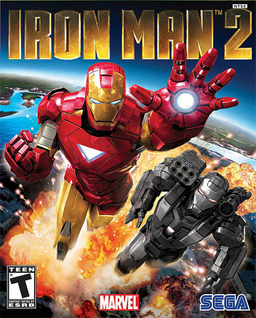
Iron Man 2 is an action-adventure video game loosely based on the film of the same name. It was released in Europe on April 30, 2010, and in North America on May 4 for Xbox 360, Nintendo DS, Wii, PlayStation 3, and PlayStation Portable. Published by Sega, the game was developed by Sega Studios San Francisco for PlayStation 3 and Xbox 360, Griptonite Games for Nintendo DS, High Voltage Software for Wii and PlayStation Portable, and by Gameloft for iOS and BlackBerry PlayBook. A Microsoft Windows version was planned, but was cancelled.
The eighth generation of video game consoles began in 2012, and consists of four home video game consoles: the Wii U released in 2012, the PlayStation 4 family in 2013, the Xbox One family in 2013, and the Nintendo Switch family in 2017.

In video games with online gaming functionality, also called cross-compatible play, cross-platform play, crossplay, or cross-play describes the ability of players using different video game hardware to play with each other simultaneously. It is commonly applied to the ability for players using a game on a specific video game console to play alongside a player on a different hardware platform such as another console or a computer. A related concept is cross-save, where the player's progress in a game is stored in separate servers, and can be continued in the game but on a different hardware platform.















